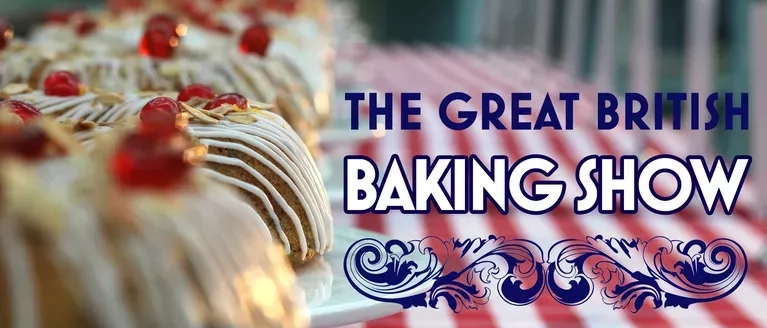A new season of The Great British Baking Show just hit Netflix, meaning 10 episodes of brand-new bakes are in our future.
Like everyone else with good taste, I love The Great British Baking Show. I love the polite and understated British bakers, the terrible jokes from the comedians, the calming close-up shots of batter mixing and bread kneading and the subtle suspense at the end of every showstopper.
The show is a competition between 12 amateur British bakers. Every week the contestants complete three baking challenges. After each challenge is explained, the hosts say, “Ready, set, bake,” which signifies the beginning of the bakers’ timed challenges. At the end, the bakes are judged and one Brit is named Star Baker for the week, while another is eliminated from the competition.
A wholesome show
Since the beginning, the show has been wildly successful not only in Britain but also in the United States. Americans immediately fell in love with the show’s wholesomeness. For example, when each contestant is introduced, the hosts often say a few sentences about their personal lives, and the scene cuts to the bakers engaging in the most mundane but delightful activities like playing with a dog, hanging out with family, knitting, gardening or simply walking down a street.
“The entire show seems to be a meditative activity to ensure none of the viewers become too stressed.”
Even though it’s a competition, the entire show seems to be a meditative activity to ensure none of the viewers become too stressed. After a baking fiasco when a Swiss roll cracks or a multi-tiered cake leans precariously in the heat, the show’s producers often cut to a scene of the babbling brook, sheep or tulips outside the tent where the contestants are about to present their imperfect bakes to the judges.
Viewers are drawn to the jolly pleasantness of the competition where bakers reassure one another after a fellow competitor burns their caramel, overwhips their meringue or, God forbid, presents a cake with a soggy bottom. The bakers often help one another when one of them runs out of time for decorations or needs a third hand to stabilize their bake. Reminder: This is a competition.
 The kindness fellow competitors have for one another is likely half the reason Americans are enamored by the show. Part of the appeal is that it is so different from our typical conceptions of competitions.
The kindness fellow competitors have for one another is likely half the reason Americans are enamored by the show. Part of the appeal is that it is so different from our typical conceptions of competitions.
Brits versus Americans
Rebecca Turkewitz wrote a satirical article for the New Yorker comparing the differences between British baking shows and American cooking shows as if she were narrating the two shows with made-up contestants Ian from Britain and Sarah from the United States.
Turkewitz said: “British: The other bakers have become Ian’s second family, forming a warm new community of like-minded, supportive individuals. American: Sarah admitted she does regret stabbing Chef Rob in the thigh with a corkscrew, even though Chef Rob is a raging misogynist with less talent in his whole body than Sarah has in each of her shriveled taste buds.”
The dichotomy is clear, and while comically exaggerated, Turkewitz’s commentary is poignant. We can credit (or blame) capitalism and the idea of the American dream for our society’s obsession with achievement. American value is doled out on the basis of accomplishment. Americans are drawn to The Great British Baking Show because every season the contestants, as well as the judges, place human decency and the simple act of enjoying themselves and the people around them above competitive achievement.
At the end of the season, the winner is not given hundreds of thousands of dollars in cash or promotional gifts. They’re awarded a simple glass cake stand and a bouquet of flowers. Perhaps that is why the bakers help each other and all seem genuinely to have a good time, as if winning or losing the technical challenge really isn’t the end of the world.
Turkewitz continued: “British: Ian’s fondest memory from the season so far was when everyone came together to help him plate his lavender-blueberry macarons. His most frustrating moment came when the judges said his apple cake was ‘stodgy’ and ‘a bit disappointing.’ American: Sarah’s favorite moment so far was when that asshole Rob dropped his duck confit on the ground after the hosts released the swarm of angry hornets. Her most upsetting memory is when the judges called her a ‘talentless clown’ and described her chilaquiles as ‘an affront to God.’”
Pandemic baking
While The Great British Baking Show always has been popular in the U.S., the streaming statistics skyrocketed during the pandemic when we were craving something calming and wholesome to unite us in a time when we were quarantined alone at home and desperately feeling the effects of prolonged isolation.
Today, we’re no longer trapped in our houses and yet isolation only continues to grow. Through the radical increase of polarization in recent years, our society is more segmented and isolated than ever.
 As we gear up for the midterms, political and social extremism is rampant and collective animosity toward the opposite extreme is palpable. A recent poll by YouGov tracked Americans’ predictions about political divides in the next decade. It found 66% of Americans thought political divisions have intensified since the beginning of 2021 and 62% expect those divisions to worsen in coming years.
As we gear up for the midterms, political and social extremism is rampant and collective animosity toward the opposite extreme is palpable. A recent poll by YouGov tracked Americans’ predictions about political divides in the next decade. It found 66% of Americans thought political divisions have intensified since the beginning of 2021 and 62% expect those divisions to worsen in coming years.
Recently, some polarizing beliefs have resulted in violence. According to the same survey, three out of five Americans predict political violence will increase in the future, and two out of five Americans believe a civil war is somewhat likely within the next decade.
Collectively, we’ve had a rough few years, and I understand this grim outlook on America’s future. There’s no denying that polarization and political violence has heightened in the past few years. However, while there is no way to claim with absolute certainty that this trend will somehow reverse in the near future, I believe it will.
“Its wholesome and collaborative nature is the antithesis of our society’s polarized reality.”
I find hope in the fact that I’m not the only American who loves The Great British Baking Show. We’re drawn to the show because, as Turtewitz astutely notes, it is so different than American reality cooking TV. But more than that, its wholesome and collaborative nature is the antithesis of our society’s polarized reality. We’re no longer trapped in our homes, but Americans continue to wistfully love the show’s unifying and heartwarming genre.
Dethroning Tiger King
Remember at the beginning of the pandemic when Tiger King was everyone’s favorite binge TV show? We couldn’t get enough of the tigers, Joe Exotic or the outrageousness and scandal. In the days when we were all bored out of our minds, stuck at home, the drama of Tiger King was a form of escapism into a world that was wild in a way so different than the wildness of our world. We gathered with popcorn to theorize who was really trying to kill Carole Baskin, and for an hour we did not think about all the pandemic deaths.
 Season 1 of Tiger King was released on Netflix in March 2020, immediately after lockdowns, particularly in the northeast, were first instated in the United States. The show could not have aired at a better time.
Season 1 of Tiger King was released on Netflix in March 2020, immediately after lockdowns, particularly in the northeast, were first instated in the United States. The show could not have aired at a better time.
Six months later, The Great British Baking Show released its 11th season on Netflix. In March we needed something wild and dangerous to distract us from our collective boredom and fear. By September, we all had picked up baking as a common pastime, and we no longer craved the danger and sensationalism of Tiger King. By September, we were all feeling the effects of isolation, and we desperately needed something to unite us and to transcend the loneliness that shadowed our culture.
Perhaps we will see a similar phenomenon in American society. Just as the novelty and sensationalism of Tiger King eventually wore off, and we latched onto the more peaceful and cooperative vibes of The Great British Baking Show, we too will tire of the division and intensified ideologies in our culture.
Exhausted by division
People are naturally drawn to the flashiness of anything that is considered sensational, but after a while it becomes draining. Recent research indicates that collectively Americans are on the precipice of becoming exhausted by polarization and sensationalism.
“There are emerging consequences of polarized communications that can hurt candidates in the polls,” writes marketing professor Beth Fossen, who researched the effects of polarization on political marketing advertisements.
Fossen found that voters are increasingly turned off by political polarization and negative messaging from candidates, so much so that they were not only less likely to vote for the negative candidate, they were less likely to vote at all.
“If the dominant tone of this messaging is toxic, political campaigns run the risk of disengaging more and more voters,” Fossen writes.
“You only want to watch a screaming match for so long before eventually you just want to leave the room.”
People are simply fed up with extremism and negativity. You only want to watch a screaming match for so long before eventually you just want to leave the room. Americans’ affinity for The Great British Baking Show signifies this act of leaving.
A silly baking series is hardly the silver bullet for the discord in society, but its popularity among Americans represents a shifting tide. Polarization may continue to grow among those in structures of power, but clearly many people are growing tired of the extremes. The constant barrage of the sensational, although enticing for a while, ultimately is exhausting and leads us to take shelter in something a little calmer, a little more pleasant, a little more wholesome.
And perhaps we can take inspiration from the polite British bakers, modeling their attitudes as we go about daily life. If we did, the show’s hosts would challenge us to strive to better enjoy our time “baking,” do the best we can without killing ourselves in the process and help others along the way when they struggle. Ready, set, bake.
Laura Ellis serves as project manager for Baptist Women in Ministry. She is a former Clemons Fellow with BNG and previously served in ministry with Safe Havens Interfaith Partnership against Domestic Violence and Elder Abuse. She lives in Waco, Texas, and earned a master of divinity degree from Boston University School of Theology.
Related article:
How Miss Marple and British crime fiction help us explore mysteries of the soul | Opinion by Susan Shaw


